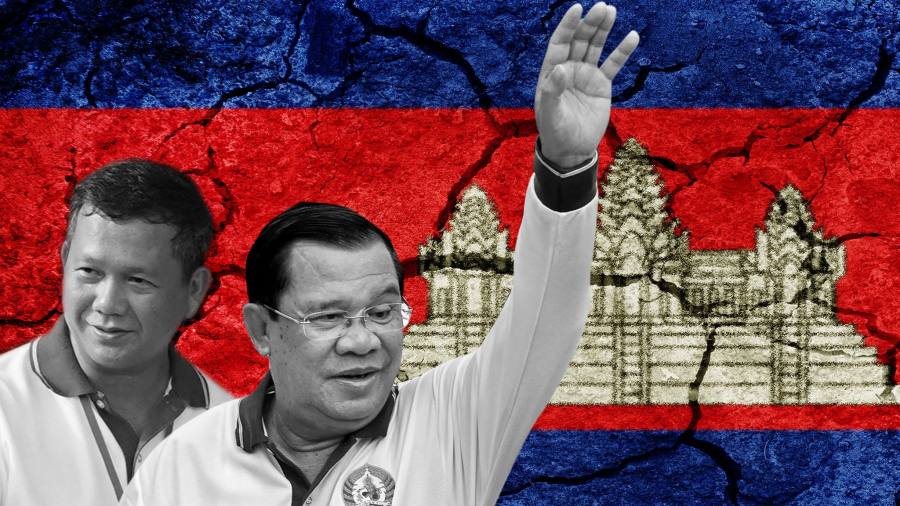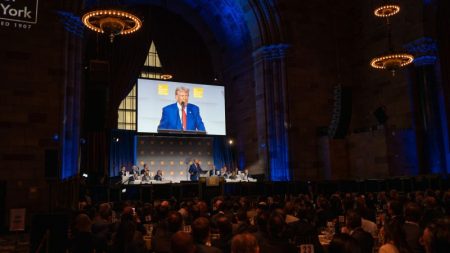Receive free Cambodia updates
We’ll send you a myFT Daily Digest email rounding up the latest Cambodia news every morning.
In July 2013, tuk-tuk driver Yem Vantith was a smiling face among a crowd of tens of thousands as he campaigned through the streets of Phnom Penh for the opposition Cambodia National Rescue party.
“I was hoping that our country would become a real democratic country, that we would get full freedom and our economy would improve,” said Vantith, 49, showing a photo of himself 10 years ago on the campaign trail, with his white hat, tie and autorickshaw all displaying the CNRP logo.
As Cambodia approaches a tightly controlled election for its lower house of parliament on Sunday, Vantith will not be trying to reprise such scenes.
A decade after the CNRP won almost as many votes as the governing Cambodian People’s party, political competition has been decisively quashed by Prime Minister Hun Sen as he prepares to pass power to his eldest son.
The septuagenarian strongman, who has led the south-east Asian nation since 1985, has presided over a sustained crackdown on political opponents, civil society and independent press, leading to sanctions from the EU on trade and the US on regime members.
Last month, social media giant Meta’s oversight committee recommended suspending Hun Sen’s account for six months over a Facebook video post in which he threatened to have opponents beaten. The prime minister pre-empted any ban by leaving the site.
In the last election five years ago, the ruling CPP claimed every seat in parliament after the CNRP was forcibly dissolved. In May, the CNRP’s successor, the Candlelight party, was prevented from registering for this year’s ballot over a paperwork technicality. That ended speculation about whether even a severely diminished opposition group — its leaders forced into exile or imprisoned — would be allowed to mount a challenge.
“There is no longer an illusion that Cambodia is a democracy,” said Transparency International Cambodia executive director Pech Pisey.
The government rejects criticism that civic freedoms have been curtailed, pointing at the participation of 17 other small parties in Sunday’s election.
“Cambodia’s commitment to a multi-party democracy remains steadfast,” the foreign ministry said following Candlelight’s disqualification.

But none of the groups running, including the splintered remnants of the once-prominent royalist party Funcinpec, have anything close to the domestic and international support networks built by the CNRP.
Cambodian political commentator Em Sovannara said unless these small parties formed alliances, which appeared unlikely, none would have an impact. “They do not have enough popular support to get a seat,” he said.
Campaigning for the 125 seats in the National Assembly has been a visibly one-sided affair. CPP supporters have held rallies, with schools in some areas organising students to line roadsides and wave flags.
Barred from the contest, the Candlelight party has suffered arrests and violent attacks against its members and a wave of defections.
“We’re almost breathing our last breath,” said a senior Candlelight member still in the country who requested anonymity.
The CPP is trying to drive up election turnout among registered voters in the country of 17mn people by passing a law barring non-voters from holding public office in the future. Hun Sen has also warned of “legal consequences” for anyone encouraging people to spoil ballots in protest, instances of which surged in 2018.
The threats are partially a response to calls for election boycotts from exiled opposition leader Sam Rainsy. But observers say they also reflect anxiety inside the CPP over a lack of support for Hun Sen’s plans to hand power to his eldest son, army commander Hun Manet.
A graduate of the US West Point military academy, Hun Manet, 45, was endorsed in 2021 as the CPP’s future prime-ministerial candidate. He is running in Sunday’s election as a candidate in Phnom Penh.
Since then, he has delivered public speeches echoing his father’s rhetoric about the party’s claimed legacy of “peace and development” and attacking “extremist” opponents.
Although assured of victory on Sunday, Hun Sen faces major political and economic challenges. As he tries to hand over the reins of the highly personalised patronage system, he must balance competing interests within the immensely wealthy, government-connected elite.
“The system is so fragile because it depends on the health of one man,” said one observer with links to the CPP who spoke on condition of anonymity, adding that if anything happened to Hun Sen, “rifts within the party would explode”.
Stephen Higgins, a founder and managing partner of Cambodia-based investment firm Mekong Strategic Capital, said the country’s economy was unlikely to meet a World Bank forecast of 5.5 per cent growth in 2023.
“The World Bank noted earlier this year that risks were to the downside, and those risks are coming to fruition, like softer external demand, global financial tightening impacting the finance sector here and a property downturn,” he said. “On top of that, tourism has not rebounded.”
Tuk-tuk driver Vantith is among the many casual workers struggling to make ends meet. While he was discouraged by Cambodia’s trajectory, he said he still harboured hope for change.
“Like fish in a trap, we’ll stay still until we get a chance, one day, to escape,” he said.
A version of this article was first published by Nikkei Asia on July 18. ©2023 Nikkei Inc. All rights reserved.
Related stories
Read the full article here





